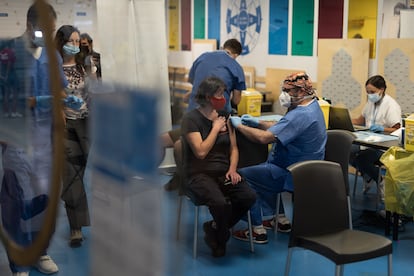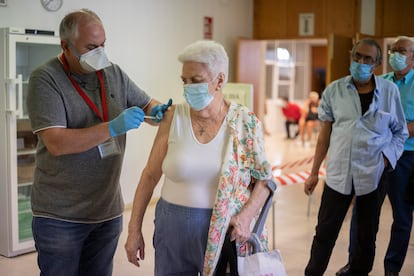Coronavirus contagions in Spain accelerate, as incidence hits 82 cases per 100,000 inhabitants
With hospital admissions on an upward trend and infections jumping 67% in two weeks, some regions are considering new measures to curb the spread of Covid-19

The epidemiological curve of the coronavirus in Spain is once again on an upward trend, with cases rising at an accelerating rate. According to the latest Health Ministry report, released on Monday evening, the 14-day cumulative number of cases per 100,000 inhabitants now stands at 82. This is up nearly 11 points from Friday, the previous day for which data is available as no figures are released on the weekend. In comparison, last Monday, November 8, the incidence rate rose just five points over the same time period.
In just two weeks, the incidence rate in Spain has risen 67%. Although the number of cases in Spain is still well below those being reported in many other European countries, in some regions, such as the Basque Country and Navarre, infection rates are double the national average. Hospital admissions for Covid-19 are also slowly rising and some regional governments are now considering introducing restrictions to control the spread of the virus.
With 79% of the population fully vaccinated in Spain, the effect of this rise in transmission cannot be compared to previous waves: today, the most-vulnerable groups are protected against developing a serious case of Covid-19 or dying, and most vaccinated people who contract the virus have minor symptoms or are asymptomatic. That said, the rise in contagions does present risks. Experts warn that the larger the number of infections, the greater the pressure on Spain’s healthcare system and its doctors and nurses.
The uptick in coronavirus infections is already being reflected in hospital admissions: 2,180 Covid-19 patients are currently in hospital, occupying 1.77% of all available beds. While this level can be easily managed by the health system – at the end of January, during the third wave, there were more than 31,000 Covid-19 patients – it is on the rise. On Monday, the number of admissions was 234 higher than on Friday. The same pattern is being seen in intensive care units (ICUs), where there were close to 5,000 Covid-19 patients during the third wave. While this figure was at 427 on Monday, it did rise from Friday, when there were 394 Covid-19 patients in ICUs.
What’s more, the epidemiological situation varies between the regions, which are responsible for their healthcare systems, organizing the Covid-19 vaccination drive and deciding on coronavirus restrictions in their territories. While Andalusia, Galicia, Asturias and Extremadura have an incidence rate of between 43 and 47 cases per 100,000, and an ICU occupancy rate below 1%, in Aragón, the incidence rate is 134 cases per 100,000, while the latter figure is at 10%.
Most of the serious cases of Covid-19 are affecting the unvaccinated. According to the Catalan regional government, the risk of being admitted into hospital for Covid-19 is 4.5 times greater for an unvaccinated person than for someone who is vaccinated, reports Bernat Coll. In Murcia, regional authorities also reported a few days ago that none of the seven ICU patients in hospital at that time (there are now 12) had been vaccinated. The lowest vaccination coverage, where there is the greatest margin for improvement, is among the 30-39 age group – where 77% are fully vaccinated – and the 20-29 population (78%).

The group of vaccination experts advising the government is also likely to recommend third booster shots of a Covid-19 vaccine to the 60-69 age group, according to health sources. This measure has been under consideration since October, when the first studies detected that Covid-19 vaccines, in particular the single-shot Janssen and Oxford-AstraZeneca, became less effective over time. A booster shot has already been authorized for the over-70 population, the immunocompromised and recipients of the Janssen vaccine.
The 60-69 age group is made up of 5.2 million people, 97.8% of whom are fully vaccinated, according to the latest data from the Spanish Health Ministry. Most of this group were immunized with AstraZeneca and, if the booster shot is approved, they will receive a third dose of either the Pfizer-BioNTech or Moderna vaccine, as is the case for recipients of Janssen. Nearly 2.7 million people in Spain have so far received a booster shot, according to the Health Ministry.
Spanish health regulators on Monday also approved a Phase II clinical trial of a Covid-19 vaccine by Spanish pharmaceutical Hipra. Speaking of the authorization, Spanish Prime Minister Pedro Sánchez said: “This second phase will take place in 10 hospitals with more than a thousand volunteers and have €15 million in support from the Spanish government. It is yet another reason to feel proud of this country.”
Restrictions
With cases rising at an accelerating rate, some regions are considering introducing new measures given the risk that contagions could continue to spike over winter and the Christmas holidays.
The Basque regional government has announced that it will apply restrictions in municipalities with high transmission rates, and has also opened debate on whether to make vaccination mandatory for certain workers, according to Spanish news agency EFE. The premier of the Basque region, Íñigo Urkullu, said that he wants decisions on this measure, as well as the use of the so-called Covid pass – which indicates whether the bearer is fully vaccinated, has tested negative for Covid-19 or recently overcome the virus – to be made “uniformly” across Spain. He argued that it would be difficult for the Basque region to adopt these proposals “if they are not framed by a decision” made at the state level. Such measures have regularly been challenged and overruled in the regional courts since the central government lifted the nationwide state of alarm emergency situation.
In Valencia, premier Ximo Puig said his government is also working on the legal process to make a Covid pass a requirement for entry “in certain centers.” Although he did not specify exactly what centers he was referring to, he said they would be sites “where most contagions happen, enclosed spaces where it is difficult to be with a face mask.” On Monday, the regional health chief of Catalonia, Josep Maria Argimon, also indicated that the Catalan government is considering extending the use of the Covid pass, which is currently only required in nightlife venues. Any changes, however, will need to be approved by the Catalan High Court.
Meanwhile, in Galicia the regional government is reconsidering its plan to relax the use of face masks at schools due to the rise in cases. While experts say that schools are safe spaces, this does not mean they are infection-free. Last week, two outbreaks were reported in schools in Madrid and Barcelona – one in Getafe, with at least 56 cases and another in Sant Cugat, with more than 40. Given the upward trend, the debate over whether face masks should or should not be worn in outdoor play areas remains open.
Tu suscripción se está usando en otro dispositivo
¿Quieres añadir otro usuario a tu suscripción?
Si continúas leyendo en este dispositivo, no se podrá leer en el otro.
FlechaTu suscripción se está usando en otro dispositivo y solo puedes acceder a EL PAÍS desde un dispositivo a la vez.
Si quieres compartir tu cuenta, cambia tu suscripción a la modalidad Premium, así podrás añadir otro usuario. Cada uno accederá con su propia cuenta de email, lo que os permitirá personalizar vuestra experiencia en EL PAÍS.
¿Tienes una suscripción de empresa? Accede aquí para contratar más cuentas.
En el caso de no saber quién está usando tu cuenta, te recomendamos cambiar tu contraseña aquí.
Si decides continuar compartiendo tu cuenta, este mensaje se mostrará en tu dispositivo y en el de la otra persona que está usando tu cuenta de forma indefinida, afectando a tu experiencia de lectura. Puedes consultar aquí los términos y condiciones de la suscripción digital.








































